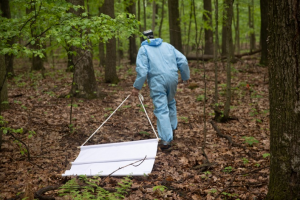Provided by the Pennsylvania Department of Health:

Last week, officials from Pennsylvania’s departments of Health, Environmental Protection (DEP), and Conservation and Natural Resources highlighted the state’s tick surveillance program and offered tips on how residents can protect themselves from tick bites.
“As the weather gets warmer and we all start spending more time outdoors, we want to emphasize that ticks are everywhere in Pennsylvania,” state Department of Health Secretary Dr. Rachel Levine said. “Ticks can carry many diseases that can be harmful to our health, such as Lyme disease. It is essential that when spending time outdoors, whether you’re at a sporting event, a state park or even walking your dog, you take the precautionary steps needed to decrease your risk of tick bites.”
Ticks can be found in all corners of the state and can infect humans year-round. It is important to take the necessary steps to protect yourself, your family and even your pets from tick bites when spending time outdoors.
“Whether it’s strong sun, severe weather or the presence of ticks and possible Lyme disease, outdoors enthusiasts must be prepared and proactive when they enter our state parks and forestlands,” said Department of Natural Resources (DCNR) Secretary Cindy Adams Dunn. “DCNR is committed to educating both our visitors and employees on cautious safeguards, ensuring safe play and work afield.”
DCNR continues to post tick-warning signs and other information at all 121 state parks and 20 forest district offices, and has a team coordinating the supply of anti-tick spray and clothing, and insect-removal kits to its field-based staff.
Those spending time outdoors should take the proper preventative measures to limit their exposure to ticks. These include wearing long sleeve shirts and long pants and using an insect repellent with DEET. After spending time outdoors, it is important to thoroughly check yourself for ticks, immediately remove any attached ticks and take a shower. Showering will also wash off any unattached ticks that may be on your body. Make sure to change clothes and place worn clothes in the dryer at a high temperature to kill any ticks that might still be left. Check pets that spend time outside too.
Toasses the risk of tickborne illnesses across the state, the DEP is conducting a five-year environmental surveillance of ticks. This survey, which is funded annually though the state budget, is part of the Pennsylvania Lyme Disease Task Force recommendations intended to fight the growing incidence of Lyme and other tick-borne diseases.
“Lyme disease affects thousands of Pennsylvanians every year, but ticks are also known to carry other pathogens that could infect humans,” said DEP Secretary Patrick McDonnell. “This survey will provide important data that will help us better understand these arachnids in our environment and inform Pennsylvanians on how, when and where to avoid getting bitten by a disease-carrying tick. We want everyone to enjoy the outdoors and take the proper precautions to avoid contact with ticks, and we are proud to support the Lyme Disease Task Force’s efforts to protect Pennsylvanians.”








